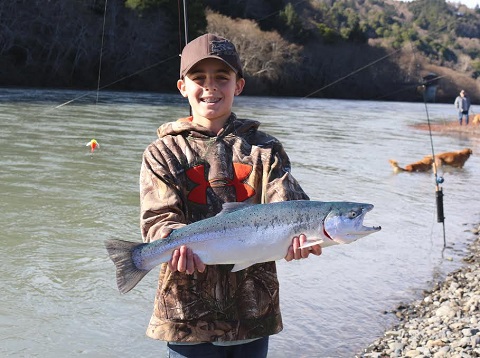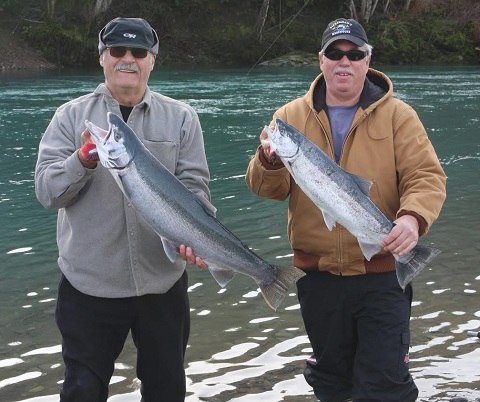Saltwater Fish Report for 1-14-2017
Snow melt raises rivers to flood stage
Chetco River - Brookings, OR (Curry County)

by Larry Ellis
1-14-2017
Website
What happened last week to northern California and southern Oregon rivers was somewhat similar to Isaac Newton's supposed gravitational quotation where he's been loosely quoted to say, "Whatever comes up must come down." Tada! The law of gravity was explained.
Only the phenomenon that happened in the last seven days to local-area rivers like the lower Rogue, Chetco and Smith, which was caused by fresh-packed snow in each prospective river's inland valleys rivaled Newton's theory and inevitably lead to another loosely-quoted law of aquatic physics.
"Whatever freezes must eventually un-freeze" (or thaw). But this phenomenon can only occur if and only if air temperatures are raised sufficiently in a short enough period of time to turn snow and ice into water rapidly (and if and only if you're not a glacier). And once again - Tada! The law of severely rising rivers not being caused by immediate precipitation was explained last week as well.
So due to previous weeks of unseasonably-cold weather combined with lots of snow pack in each river's prospective inland valley, combined with an eventual rise in ambient air temperatures - snow, ice and hale inland rapidly melted, which in turn caused local-area rivers to rise very high and very quickly, and in some cases, even reach flood stages.
Let's take the Rogue River at Agness for example. Last week it was predicted to reach 13 feet (or 34,000 cubic feet per second) by Monday. On Monday, it in fact reached 15.85 feet (or 48,900 cfs).
But it got worse, much worse.
On Tuesday when I was in Gold Beach, the Rogue had reached well above the flood stage of 17 feet at 18.81 feet, and was barreling down the river at 67,000 cfs. It was a sight to behold.
The docks at Jot's Resort in Gold Beach at first didn't appear to be there. That was only because the rapidly-flowing high water had completely covered them up. Logs were rolling down the river like broken stacks of cordwood.
But the worst was yet to come.
On Wednesday, the Rogue had crested to 21.88 feet (well above the beginning of the flood stage) and was flowing at 89,300 cubic feet per second!
The Chetco River, which was predicted to reach 15,500 feet by Monday, actually crested to 32,700 cfs on Sunday, and 32,600 cfs on Tuesday.
The Jed Smith gauge on the Smith River recorded some astronomical events as well. The Smith crested to 65,900 cfs on Sunday, dropped, and again crested at 70,700 cfs on Tuesday.
Now all the aforementioned rivers are dropping. So what does that mean in terms of fishing? Steelhead baby! - and January's always the prime month to nab an acrobatic steelhead on any of the aforementioned rivers. As soon as these rivers start dropping and clearing, it's time to deploy your favorite river technique.
California's Smith River is always the quickest to drop and the quickest to clear. I actually saw a party of 8 drift boats floating the Smith just above Hwy 197 on Thursday morning (with a few people actually hooked up!) when the river was flowing around 12,000 cfs, or just around 14- to 15-feet.
The Smith is notorious for its emerald-green hues and on this day, milky-white water was artfully weaved throughout the river, indicative of snow melt. It should be fishing well this weekend as it drops and clears even more.
On the same (Thursday) the Chetco was muddy at the boat basin and was flowing between 9,000 and 10,000 cfs, so the best is yet to come as this river drops and clears even more. Plunkers, wait for the first chance the river clears to a slate-gray or pea-green hue and when it is flowing over 4,000 cfs, which should be today (Saturday). The Chetco should continue to get even better with infiltrates of fresh chrome missiles this weekend and into the following week as the river drops below 4,000 cfs, when it will be available to side-drifter, plug pullers and drift-fishermen.
The Rogue River as of Thursday was still flowing over 26,000 cfs. It will start fishing for plunkers as soon as it starts losing its muddy appearance, although Jim Carey from the Rogue Outdoor Store says that the Rogue is known for catching steelhead in muddy conditions, although non-muddy circumstances are always better.
I would look for the lower Rogue to fish best next week, when the river starts hovering around 10,000 cfs or so. Look for good winter steelhead guides like John Anderson and other guides recommended by the Rogue Outdoor Store.
So plunkers, again you will get the first shot at the Oregon rivers, and then after plunking techniques start losing favor, every other technique should start breaking loose. Mother Nature gets all the credit for this call as January has always been peak season for these silver bullets.
So prepare to fish all techniques as next week progresses.
Tight lines.
Larry Ellis, author, writer, columnist and photographer has had a 50-year passion for fishing in California and Oregon's saltwater and freshwater venues. He is a well-known writer for Oregon, Washington and California Fishing and Hunting News, Northwest Sportsman, California Sportsman and Pacific Coast Sportfishing. He currently writes monthly for Salmon Trout Steelheader Magazine, and is the author of two books, "Plug Fishing for Salmon" and "Buoy 10, the World's Largest Salmon Run." Both books can be bought from Amato Publications (amatobooks.com), Amazon and eBay. Ellis particularly loves living in his hometown of Brookings, Oregon - The heart of salmon country and gateway to fishing paradise.

Website Hosting and Design provided by TECK.net

